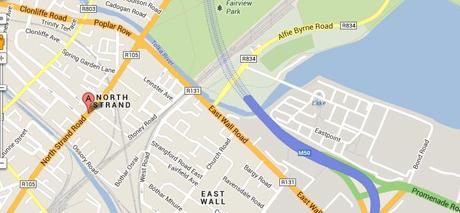
The title refers to "an encounter" that two Dublin boys have while skipping out of their Catholic school one late spring day. An older man approaches them in a field, talks aimlessly with them of this and that, then walks away and--well, here, I'll just set down the passage everyone talks about:
After a long while his monolog paused. He stood up slowly, saying he had to leave us for a minute or so, a few minuts, and, without changing the direction of my gaze, I saw him walking slowly away from us towards the near end of the field. We remained silent when he had gone. After a silence of a few minutes I heard Mahony exclaim:
--I say! Look what he's doing!
As I neither answered nor raised my eyes Mahony exclaimed again:
--I say . . . He's a queer old josser!
When the man returns to the boys, the one named Mahony runs off, leaving the narrator alone to listen to talk that now seems more menacing. Boys must not have sweethearts. They must be whipped if they do, especially if they lie about it. The narrator stands up and leaves during a pause in the odd monolog. He joins Mahony and the story ends.
The story had begun with descriptions of the Catholic school routine and the games the boys played when school was out. The narrator allows to drop his dissatisfaction with his life:
The mimic warfare of the evening became at last as wearisome to me as the routine of school in the morning because I wanted real adventures to happen to myself. But real adventures, I reflected, do not happen to people who remain at home: they must be sought abroad.
The game of hooky thus acquires the aspect of an initial striking out for the territory, but the boys meet up only with ordinary scenes of Dublin life, to which the adjective "squalid" is at one point applied, before the encounter with the old josser. The story is not an advertisement for Dublin, though the boys' route through the city is carefully, almost lovingly, chronicled, with reference to the actual street names--North Strand Road, Wharf Road (a popular name for East Wall Road)--so that assisted by Google maps one can today trace their steps.
